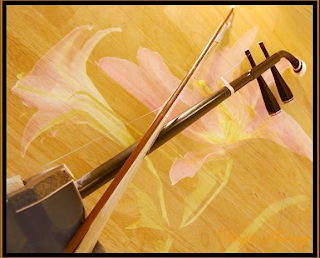李老师,旅加二胡演奏家,艺术硕士学位。国家一级演奏员,中国音协二胡学会会员,中国民族管弦乐学会胡琴专业委员会会员,加拿大魁北克音乐家协会会员,担任“敦煌杯”中国二胡国际比赛北美赛区评委。
曾任无锡锡剧院,歌剧舞剧院民族乐团首席,二胡独奏演员;江苏高等师范学院客座教授,还精通高胡,板胡,京胡,中胡等胡琴演奏。
出生于艺术家庭并成长在阿炳的故乡-无锡,自幼学习二胡和小提琴,师从著名二胡演奏家 教育家魏松坤老师。曾获华东六省一市比赛一等奖,各级民乐比赛一等奖若干,并随艺术团多次出访演出。18岁跨入南京艺术学院的音乐大门,师从二胡演奏家欧景星教授,并得到二胡大师朱昌耀,邓建栋的悉心指导。她曾为法国里昂电视台录制音乐专题片《东方音乐》,里昂市长称她是“东西方艺术的文化使者”。她的演奏圆润甜美,悦耳动听,并充分表现了丰富多彩二胡演奏技巧,使作品更富有感染力,她还为多部电影,歌舞剧担任二胡独奏,开过多场音乐会。
在教育上,李老师改变了传统二胡的教授方法,因材施教,总结出一套适合少儿和成人不同的二胡教育方法,使学生让二胡“渲泄心声,用心灵歌唱”,同时强化了二胡的演奏技巧,在结合二胡民族性与歌唱性的演奏特点的同时,汲取小提琴演奏技巧的精髓,她倡导学生在继承传统音乐的根基上大胆创新,从中培养音乐的诠释理解能力,为此她的学生在多种比赛中获奖,很多学生先后考入中央音乐学院,上海音乐学院,南京艺术学院等专业院校,成人也在较短的时间内达到了较高的演奏水平。
联系邮箱:vivianudm@yahoo.com
Vivian was born in a very musical city in China. She was raised in an artistic family and has played violin, as well as the erhu, the Chinese two-string violin, since age six. At age 18, she started her studies in erhu performance at the Arts University of Nanjing. She obtained a master's degree in 2003, and then served as concertmaster (first violin) for the Jiangsu Chinese National Orchestra.
Afterwards, Vivian was actively involved in performing, teaching, as well as in promoting and managing various cultural activities. As a Member of the Chinese Society of National Instrumental Music, she has produced a music program with Lyon's TV Station. The mayor of this city said of her:"she is a cultural envoy of East and West, an artist who speaks with the world through Erhu."
Vivian immigrated to Montreal, Canada, in 2006. As a musician residing in Montreal, She performed in the “Oriented Towards Sound” concert at the Oscar Peterson Hall (2007-2008), and at the Dawson Theatre (2009-2014), organized by Erhu Music multi Montréal. She also made recordings for “Chinese Poems”; “Natural” (2007); “The Five Elements” (metal, wood, water, fire and earth), “By improvisation with Guzheng” (2008); and the animated film, “The Banquet of the Concubine”, with the National Film Board of Canada (2012). At the same time, Vivian performed in a series of concerts at the Ahuntsic-Cartierville (2008), Frontenac (2009, 2014), at the Cultural Centre in Montreal; the Theatre Collège Jean-Eudes, in Quebec City and Gatineau (2010); and the Chinese Lantern Festival at the Botanical Garden of Montreal (2008, 2011, 2012, 2014). She was also the finalist for the 2014 Diversity Arts Council of Montreal. Vivian perform in the Butterfly Lovers Concert with Toronto Chinese Orchestra in 2019,and got the Outstanding Chinese Artist Award in the same year.Having performed in many locations in Montreal, she is one of the few Montreal's prominent professional Erhu players. She cooperates enthusiastically with musicians from different cultural background. Vivian hope to share her melodies with everyone in every corner of the world.

